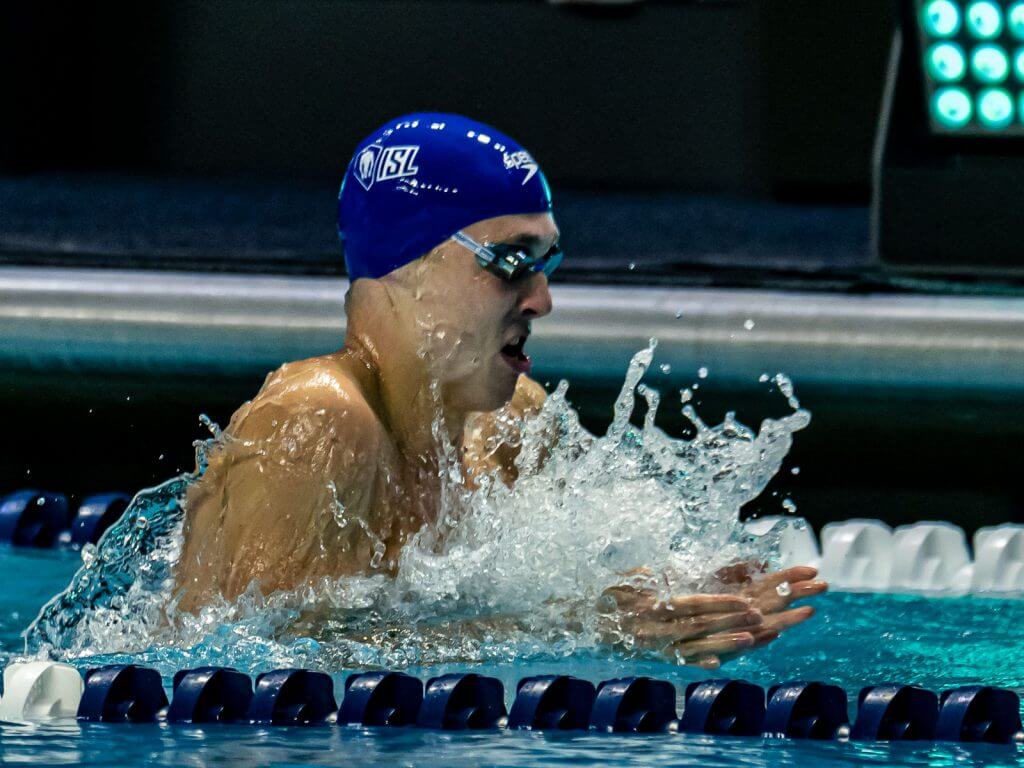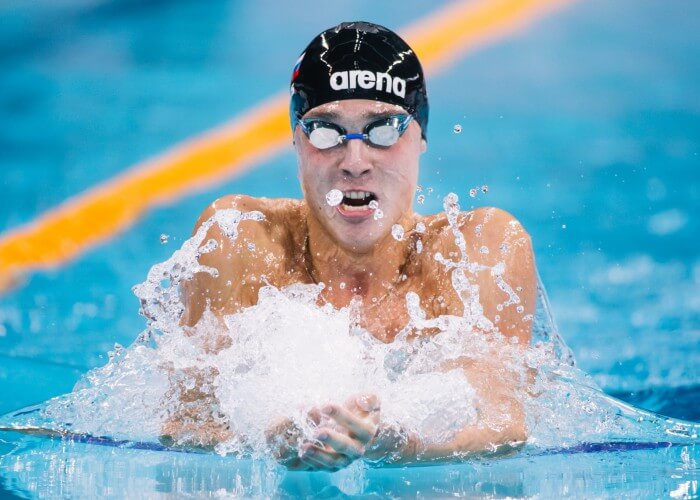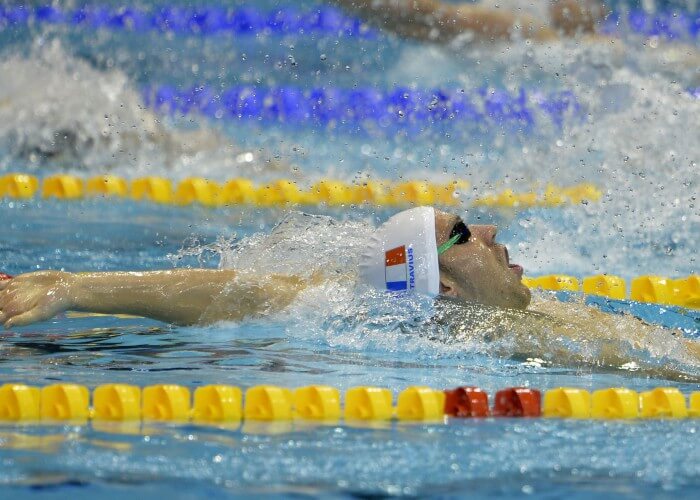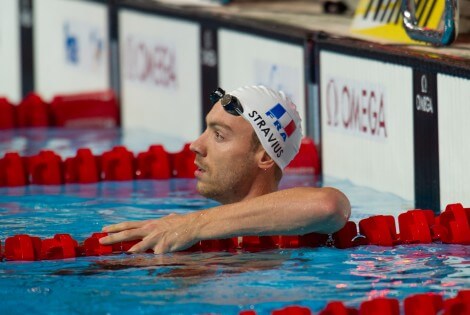Chupkov Refuses To Yield To Qin In 200 Battle – & Stravius Races His Last 50 Back In Wuhan

Anton Chupkov refuses to yield to Qin Haiyang pressure – 7th Military Games, Wuhan, Day 4
China has celebrated getting the better of most this week in Wuhan at the 7th Military but Anton Chupkov refused to yield. The Russian World champion was almost 2sec down on his July World record in late October but a 2:07.95 was good enough for gold after a last-lap rally got him past Qin Haiyang.
Qin, who finished 14th in the event at World titles in July on 2:09.11 (inside a best of 2:09.39, at which he had held the World Junior Record since 2017), went a touch better today. His 2:08.41 career high swum from the front. Chupkov sat on Qin’s shoulder the whole way, the reserve in a man who set a world record of 2:06.12 obvious as he clawed his way back into contention and tore 0.92sec off his rival from last turn to last stroke.
Here’s the ebb and flow in the battle for the crown:
- 30.23 (2) 1:03.43 (2) 1:35.94 (2) – 32.01 – 2:07.95 Chupkov
- 29.77 (1) 1:03.02 (1) 1:35.48 (1) – 32.93 – 2:08.41 Qin
The bronze went to Ukraine’s Mykta Koptielov in 2:14.43, by which time Chupkov had his mind on the next challenge and, as it turned out, gold, as a member of Russia’s 4x100m medley relay in another battle with the hosts, China.
Russia’s quartet of Roman Larin (54.98), Chupkov (58.72), Daniil Pakhomov (52.37) and Vladislav Grinev, whose 47.50 homecomer swept him past China, the leader from go to just shy of the last turn, and sealed a championship record of 3:33.57. China took silver in 3:34.44, breaststroker Yan Zibei, who was confined to silver by Chupkov in the 100m solo this week, clocking a 58.07 split. The bronze went to Poland in 3:37.44.
On beating China in the 4x100m medley relay, Chupkov told Swimming World: This is precisely what we wanted to do right now and we have done that. We have a great team. We gathered the coolest swimmers and got a great result. We wanted to tear them into pieces in the relay. I was swimming after the 200m, feeling heavy and tired, and I gave it everything I had. The guys took up the baton and earned the victory.”
On Russia’s in-pool rivalry with the Chinese in Wuhan, Chupkov said: “The Chinese team is at home. They put forward almost all of the best athletes from the Chinese swim team. We have the leaders of the world ranking here and we have won our races against them.”
Asked about his 2:06.12 World record at World Championships in Gwangju in July and other stunning new global standards, such as those established by Britain’s Adam Peaty with a maiden voyage inside 57sec cover 100m breaststroke, and Kristof Milak, the Hungarian who cracked 1:51 and Michael Phelps’ 10-year-old record in the 200m butterfly, Chupkov said:
“It’s about competition. The competition is growing. I had huge competition in the final of the 200m breaststroke at the world championships, so it was clear that whoever won there would become the new world record holder. It is very good when there is such strong competition. It means that the results will grow no matter what and records will tumble. This is very interesting to observe.”

Anton Chupkov – Photo Courtesy: Singapore Swimming Federation
The Russian ace revealed that he is aiming to take on both the 100 and 200m at the Tokyo 2020 Olympic Games. He may not rate his chances against Peaty and Coli over two laps but he has team in mind: “I want to do both because I want to compete in the 100m in the relay. We will fight in the relay for medals and I want to swim in it. For that reason, I swim and prepare for the 100m breaststroke. Of course, the focus is more on the 200m.”
Chupkov was “happy that I consistently swim under 2:08 (in the 200m) so this is very good. It doesn’t matter what form I am in, good or not so good, I am stable at 2:08.”

Kosuke Kitajima and his status on the cover of Swimming World back in the day – Photo Courtesy: Swimming World Magazine
In Gwangju at World titles, Chupkov got to meet the most decorated breaststroke ace in history, Kosuke Kitajima. The Russian champion recalled:
“We took a photo together in Gwangju and he congratulated me. He is a living legend of breaststroke and probably the coolest swimmer, definitely the coolest breaststroke swimmer, in history because he won everything – 100 and 200 – he won everything. It was very cool to see him and get to talk to him in person, and it was nice that he congratulated me.”
Qin was matter of fact after setting his lifetime best for silver: He said: “I accept it because it is a fact now. The only thing I can do is to look forward. So I will sum up my experience and hope to get a better one next time.”
Meanwhile, by the time Grinev walker out for the medley relay, he was already a champion on the day: undisputed champion, one might say, in that a 47.86 in the 100m freestyle, a championship record achieved despite a messed up finish, kept the rest well at bay. Silver went to Brazil’s Pedro Spajari in 48.75, bronze to Poland’s Kacper Majchrzak in 48.99.

eremy Stravius – Photo Courtesy: Gian Mattia Dalberto/Lapresse
The men’s 50m backstroke marked what looks set to be the last backstroke dash of one of the most successful swimmers in that event ever – and it ended in silver by 0.02sec. Gold went to Guilherme Basseto, of Brazil in 25.34, France’s Jeremy Stravius on 25.36, the bronze to Italian Nicolo Bonacchi in 25.51.
With 14 Olympic and World Championships medals to his name for France, Stravius boasts a treasury that now includes eight international podiums in the 50m backstroke, 2009-2019.
Why was he still battling? “I think it was the last time that I swim the 50 back this season and of my career because this is my last season and the 50 back is not in the Olympic Games,” said Stravius.
The former World 100m backstroke champion and member of France’s Olympic gold-winning 4x100m freestyle at London 2012 revealed to Swimming World that his Tokyo2020 Olympic targets are the 100m butterfly and the 100m freestyle, with French relays in mind.

Jeremy Stravius – Photo Courtesy: Joao Marc Bosch
On memories of his backstroke dash career, Stravius said:
“Shanghai in 2011 is a good memory (won gold in the 100m backstroke and two relay silvers). I have very good memories in the 50 back but now it is finished and I just concentrate on the other events. I wanted it to be a win this race [today] like my team-mate Melanie Henique (50m butterfly gold in the race before his) and to have the national anthem but it is not for today. It’s second place, it’s a good race but I am not really happy with the time. I think I can swim 25.1 or 25.2.”
Henique laid down a 25.96 championship record for the ‘fly dash crown ahead of China’s Zhang Yufei, 26.20, and Brazil Daiene Dias, on 26.66.
That wasn’t the end of French celebrations: in the women’s 200m medley, Fantine Lesaffre added the short medley title to the 400m crown she claimed on the first day of action in Wuhan. Her 2:12.07 established a championship record and fended off China’s Yang Chang, 2:13.37, and Russia’s Viktoria Beliakova 2:13.72.
All of which made day 4 quite different to the first three in Wuhan. China had dominated all sessions until this one but there was still room for cheering from the home crowd. The men’s 400m freestyle went to Ji Xinjie in a championship record of 3:48.33; the women’s 200m breaststroke also witnessed a meet mark, Yu Jingyao at the helm on 2:23.36; and the Chinese women’s 4x200m freestyle quartet claimed gold in 7:57.06, Russia closest on 8:02.83.



